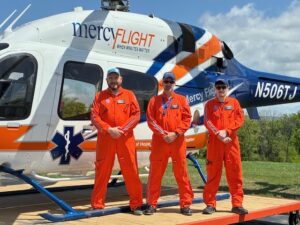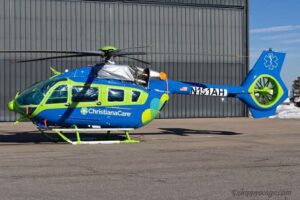Premiere Health | February 17, 2025 | Dayton, OH
The four Premier Health Hospital Foundations have announced a system-wide campaign to raise $13.5 million for a new CareFlight helicopter. This advanced aircraft will replace a 34-year-old Dauphin helicopter, the oldest in Premier Health’s fleet.
The new aircraft, a Leonardo AW169, will set a new standard for air ambulance services in the region, offering unmatched speed, enhanced safety features, and cutting-edge technology. Capable of reaching speeds up to 200 mph, the new aircraft is capable of carrying two patients simultaneously along with a care team consisting of nurses, paramedics, and a pilot.
“CareFlight has been a vital lifeline for our region for more than 40 years, providing critical care when it’s needed most,” said Michael C. Riordan, president and CEO of Premier Health. “This new generation of aircraft reaffirms our commitment to our mission – To Care. To Teach. To Innovate. To Serve – by providing our community with the highest level of emergency medical services for decades to come.”
The enhancements in safety and technology on-board the new CareFlight AW169 will include APU mode, which allows the rotor blades to stop during patient loading and unloading, as well as advanced avionics like a four-axis autopilot system, night vision goggle compatibility, and collision avoidance systems.
“As aviation technology continues to evolve, it’s essential that we stay at the forefront to meet the dynamic demands of our life-saving missions,” said Amanda McClure, MHA, BSN, RN, vice president of service integration, Emergency and Trauma Institute at Premier Health. “This new aircraft represents a significant leap forward in our ability to provide the highest level of care.”
Since the program started in 1983, CareFlight has transported and cared for nearly 90,000 patients. The program’s helicopters and Mobile Intensive Care Units serve a 150-mile radius from Miami Valley Hospital’s Level I Trauma Center in Dayton, which includes most of Ohio and parts of Indiana, Kentucky, Michigan, and West Virginia. The program has been accredited by the Commission on Accreditation of Medical Transport Systems since 1994.
“The Care in the Air campaign is about more than funding a new aircraft—it’s about investing in the future of critical care for our region,” said Jenny M. Lewis, MBA, CFRE, system vice president of philanthropy at Premier Health. “Every gift to this campaign will help save lives and provide hope for families during their most vulnerable moments.”
Leonardo S.p.A. in Italy is assembling the new CareFlight aircraft, which is anticipated to enter into service by spring 2026.
Premier Health’s four hospital Foundations, including Atrium Medical Center Foundation, Good Samaritan Foundation-Dayton, Miami Valley Hospital Foundation, and Upper Valley Medical Center Foundation, are asking the community to support this life-saving initiative through their Care in the Air campaign. Donations of all sizes are welcome and will directly contribute to the purchase of the new CareFlight aircraft.
To learn more about the campaign or to donate, please contact the Premier Health Hospital Foundations at (937) 208-2700 or visit premierhealth.com/foundations.











